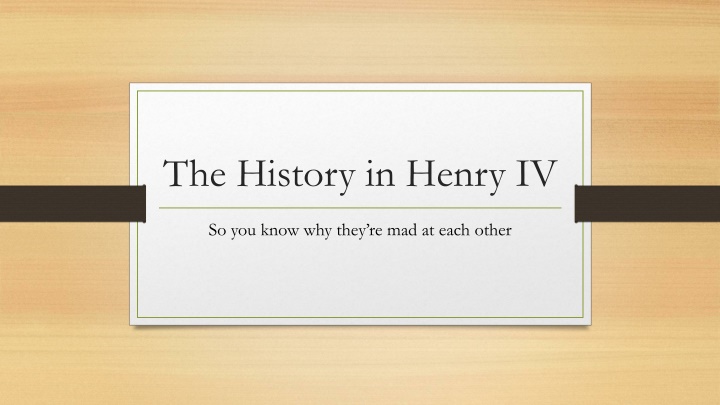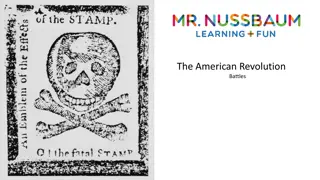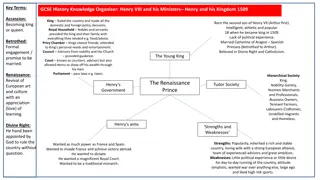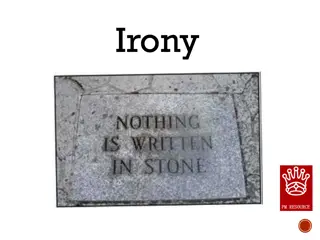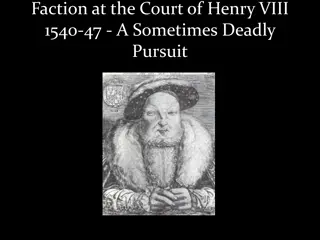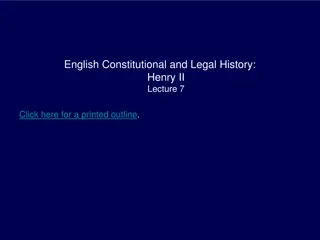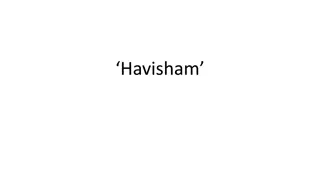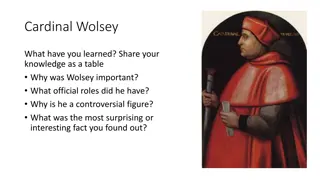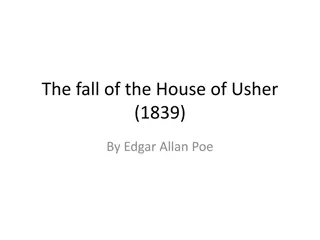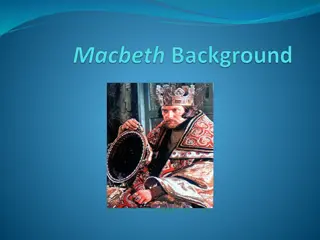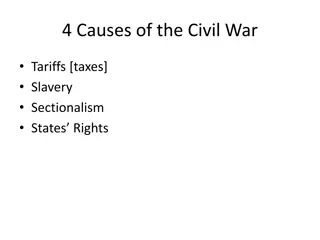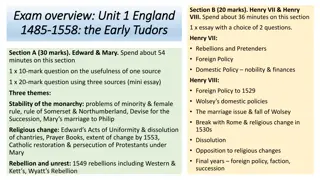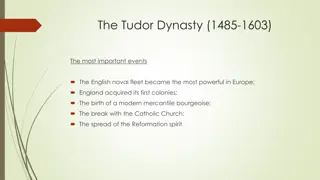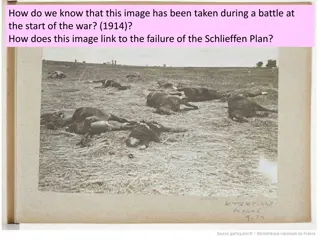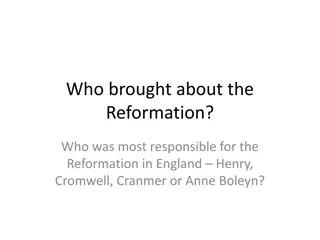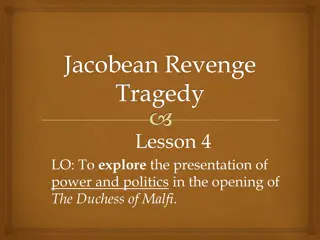The Intrigues and Battles in Henry IV: A Dramatic Saga
The play Henry IV, Part 1, delves into the real battle of Shrewsbury where King Henry IV's forces clash with rebels vying for the crown, notably led by Hotspur. Meanwhile, Prince Hal, the king's son, navigates tavern intrigues to expose Falstaff's deceit. The narrative unfolds with conflicts, deceptions, and shifting loyalties that culminate in redemption, death, and banishment as Hal ascends to become King Henry V.
Download Presentation

Please find below an Image/Link to download the presentation.
The content on the website is provided AS IS for your information and personal use only. It may not be sold, licensed, or shared on other websites without obtaining consent from the author.If you encounter any issues during the download, it is possible that the publisher has removed the file from their server.
You are allowed to download the files provided on this website for personal or commercial use, subject to the condition that they are used lawfully. All files are the property of their respective owners.
The content on the website is provided AS IS for your information and personal use only. It may not be sold, licensed, or shared on other websites without obtaining consent from the author.
E N D
Presentation Transcript
The History in Henry IV So you know why they re mad at each other
The scenario Henry IV, Part 1, is all about the (real) battle of Shrewsbury between the king s army and rebels seeking his crown. The dispute begins when Hotspur, the son of Northumberland, breaks with the king over the fate of his brother-in-law, Mortimer, a Welsh prisoner. Hotspur, Northumberland, and Hotspur s uncle Worcester plan to take the throne, later allying with Mortimer and a Welsh leader, Glendower.
Meanwhile . . . As the rebellion against the king develops, Prince Hal Henry IV s son and heir carouses in a tavern, as he has for years. He plots to trick Sir John Falstaff and his friends, who are planning a highway robbery, in order to show Falstaff s true cowardice. Hal and a companion will rob them of their loot then wait for Falstaff s lying boasts. The trick succeeds, but Prince Hal is summoned to war and fun times are over.
The outcome in this play and beyond In the war, Hal saves his father s life and then kills Hotspur, redeeming his bad reputation. Falstaff, meanwhile, cheats his soldiers and takes credit for Hotspur s death. Hal lets him do it, but he s annoyed with Falstaff by the end. In the next play (Henry IV part 2), this conflict continues until Prince Hal becomes King Henry V and banishes Falstaff.
Three Groups of Characters King Henry IV and his Men King Henry IV, formerly Henry Bolingbroke Prince Hal, Prince of Wales and heir to the throne (also called Harry and Harry Monmouth) Earl of Westmoreland Sir Walter Blunt Those who oppose King Henry IV The lowlifes Prince Hal hangs out with
Three Groups of Characters 1. King Henry IV and his Men King Henry IV, formerly Henry Bolingbroke Prince Hal, Prince of Wales and heir to the throne (also called Harry) Earl of Westmoreland Sir Walter Blunt 2. The Tavern Crew Sir John Falstaff Poins (also called Edward, Yedward, and Ned) Bardolph Peto Gadshill, setter for the robbers Hostess of the tavern (also called Mistress Quickly) 3. The Rebels who oppose the King Hotspur (Sir Henry, or Harry, Percy) Lady Percy (also called Kate, Hotspur s wife) Earl of Northumberland, Henry Percy, Hotspur s father Earl of Worcester, Thomas Percy, Hotspur s uncle Edmund Mortimer, earl of March Lady Mortimer (also called the Welsh lady ) Owen Glendower, Welsh & father of Lady Mortimer Douglas (Archibald, Earl of Douglas) Archbishop (Richard Scroop, archbishop of York) Sir Michael, a priest or knight serving the archbishop Sir Richard Vernon, an English knight
Who Are These People? Falstaff, Poins, and Bardolph are fictional creations The other figures in this play are based on real people, knights, kings and lords of the middle ages in England, Scotland and Wales These characters and what happens to them were already familiar to Shakespeare's audience Creates dramatic irony as the people on stage make the mistakes we already know they made historically (character doesn t know, but WE do) If we know the basics of this history, we can see more of how Elizabethans would have experienced the play.
The Chain of Events (part of War of the Roses) Henry IV came to power in 1399 by forcing his cousin, Richard II, to abdicate. Five months later Richard died in prison, probably murdered. Richard had become king by direct line of succession after the deaths of his father, Edward the "Black Prince," in 1376 and his grandfather, Edward III, in 1377. Henry was the son of Edward III s fourth son, John of Gaunt, the Duke of Lancaster. In taking the crown from Richard, Henry violated the normal laws of succession. Henry, was a usurper, depending for his power on his personal popularity and the support of his nobles. Foremost amongst the nobles who helped Henry to power were the Percys: the Earl of Northumberland, his brother, the Earl of Worcester, and Northumberland's son, Hotspur. The Percys were soon dissatisfied with the king they had helped to make.
Whats behind that first speech of the king? King Henry IV launches into a long speech about the end of England's civil strife and his plan to organize a crusade against the Turks. His words are addressed to his closest advisers, and convey how tired he is of war. At the end of his speech Henry abruptly changes the topic and we hear various accounts about battles against the Welsh and the Scots. The noble Mortimer" has been taken by the Welshman, Glendower Young Harry Percy, or "Hotspur," is victorious against the Scots, but refuses to give up his prisoners to the king, probably at his uncle Worcester's suggestion. Internal strife is continuing where did these problems come from?
Succession and Usurpation Richard had nominated Edmund Mortimer, the Earl of March (Mortimer in the play), as his heir in 1398. The real Earl of March was kept under lock and key during Henry's reign. Shakespeare, however, confuses the earl with his uncle, Sir Edmund Mortimer, who married Glendower's daughter and joined the rebels in 1403. Holinshed (Shakespear s main source for his history) claims that Mortimer was taken prisoner by Glendower after leading an English rebel group against him, and that Henry was slow to ransom the earl "bicause his title to the crowne was well inough knowen." Mortimer, meanwhile, decided "to take part" with Glendower (switches sides).
No Royalty without Loyalty The issue of Mortimer's ransom is what ignites the rebellion in Shakespeare's play. Hotspur is married to Mortimer's sister (Kate in the play not her historical name). He wants Henry to ransom his brother-in-law in return for the Scottish prisoners captured at Holmedon. Henry responds by labeling the earl (Mortimer) a traitor, citing the Welsh marriage as evidence that Mortimer never did attempt to confront Glendower. Hotspur is angry at this insult to his family, and at Henry's apparent ingratitude to those who helped him gain the throne. When Hotspur learns that Richard had proclaimed Mortimer heir to the throne, he leaps at the idea of rebellion and readily falls in with the plan put forward by his uncle and his father to join forces with the Scots, the Archbishop of York, Glendower, and Mortimer against the king.
History and Subjectivity: Who Tells the Story? The deposition of Richard II is reworked by an angry Hotspur into a shameful and unjust act so that Richard becomes "that sweet and lovely rose" as opposed to "this thorn, this canker Bolingbroke." Henry tells a different story when he describes the "skipping king" Richard, and compares himself at Ravenspurgh to Hotspur now. The most obvious re-telling of history is Falstaff's marvelously embroidered account of the Gadshill robbery. Like a game of telephone, the details rapidly fly further and further from the truth.
Truth Is Hard to Find Examples: The Shrewsbury battlefield is filled with counterfeit kings. The rebels, too, are prone to deceit, most obviously in Worcester and Vernon's failure to deliver the king's offers before battle. Prince Hal's first soliloquy presents a plan which involves misrepresenting himself to everyone, and on more than one occasion he finds himself compelled to "gild" a lie for Falstaff's sake. Falstaff makes an art of lying, so much so that he can be seen as the most honest character in the play--he, at least, finds any pretence at virtue an intolerable burden. Audience must work at figuring out what s true, to interpret history, both on stage and off (maybe that s the point?).
